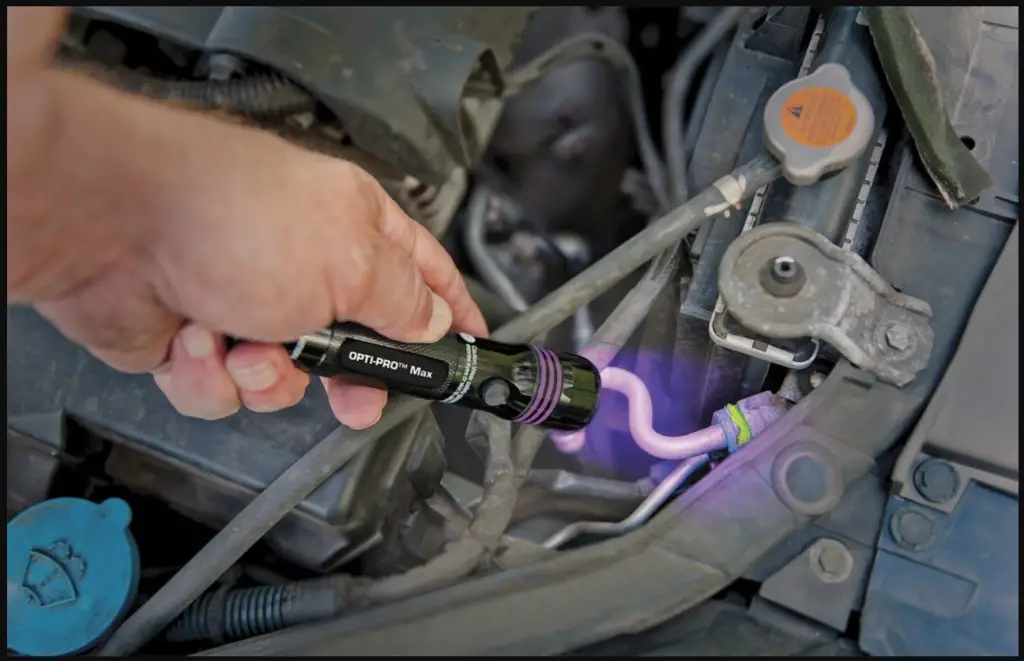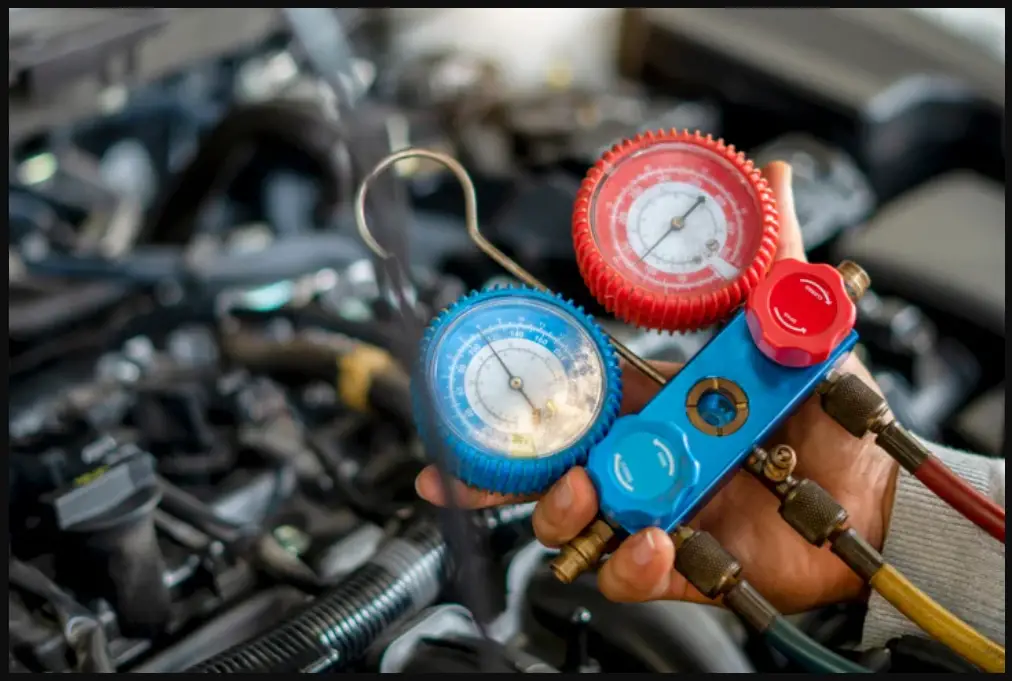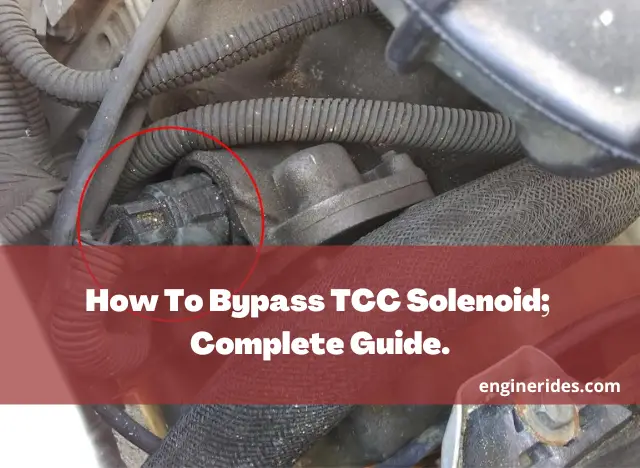AC is a must to have when it is very hot outside, and when it turns off at the time it is mostly needed, then it is a must to consider. So in this article we’ll take a closer look at the reasons, fixing, and the best practices to avoid this problem, so stick around until the end and welcome to EngineRides.
Table of Contents
What can cause Car AC to Stop Working When Hot Outside?
Several factors can contribute to your car’s air conditioning system failing to function correctly when temperatures rise. Let’s delve into four key reasons why your car AC might stop working when it’s hot outside:

01. Refrigerant Leakage
The refrigerant is the lifeblood of the air conditioning system, cycling between gas and liquid states to absorb and release heat. Refrigerant leakage disrupts this process, diminishing the system’s cooling capacity.
Leaks are often challenging to pinpoint, and as refrigerant escapes, moisture can enter the system, leading to corrosion and further complications. Small leaks may be addressed with sealants, but larger issues require professional inspection and repair.
02. Faulty Compressor
The compressor plays a vital role in pressurizing the refrigerant, facilitating efficient heat exchange. A malfunctioning compressor can impede the entire cooling process, resulting in inadequate cooling performance.
Lack of usage is a common cause of compressor issues. Stuck compressor clutches, whether constantly engaged or disengaged, can also contribute to problems. Regular operation of the AC system, even during colder months, helps prevent compressor-related issues.
03. Condenser Issues
The condenser acts as a heat exchanger, dissipating heat from the refrigerant. Damage or obstruction in the condenser can hinder this heat dissipation, reducing the overall effectiveness of the AC system.
Debris entering the condenser, commonly located behind the front grille, can obstruct airflow. While minor blockages can be cleared, significant damage may necessitate condenser replacement. This issue becomes more pronounced during hot weather when the system faces increased demand.
Chevy Express Van Electrical Problems; All Explained With Fixes
ENGINE RIDES
04. Electrical System Problems
The proper functioning of the AC system relies on various electrical components. Issues such as blown fuses, faulty switches, or problems with battery voltage and control modules can disrupt the system’s performance.
Timely troubleshooting of electrical problems is crucial to prevent acid buildup and more extensive damage. DIY fixes are feasible for those with electrical knowledge, but professional assistance is recommended for complex issues to ensure a lasting solution.
What to do when this happens repeatedly?
When your car AC stops working during hot weather, there are several steps you can take to troubleshoot the issue and potentially address the problem. Here’s a guide on what to do:
Step 01; Check for Obvious Issues
Inspect the area around your vehicle for any visible signs of damage, such as leaks, loose connections, or debris around the condenser.
Why: Identifying obvious issues can provide clues about the source of the problem and may reveal simple fixes.
Step 02; Inspect Refrigerant Levels
Use an AC pressure gauge to check the refrigerant levels. If low, it may indicate a leak.
Why: Low refrigerant levels can lead to reduced cooling efficiency. If you find a significant drop in levels, consider having the system inspected for leaks and recharged by a professional.
Step 03; Listen for Unusual Sounds
Turn on the AC and listen for any unusual noises, such as grinding or squealing, which could indicate a problem with the compressor or other components.
Why: Unusual sounds can help pinpoint specific issues, allowing you to communicate more effectively with a mechanic.
Step 04; Inspect the Compressor Clutch
Observe the compressor clutch engagement when the AC is turned on. Ensure that it engages and disengages as expected.
Why: A stuck compressor clutch can lead to AC malfunctions. If it’s stuck, consult with a professional for further diagnosis and potential replacement.
Step 05; Check Cooling Fans
Ensure that the engine compartment cooling fans are functioning properly. Inspect for any damage or obstructions.
Why; Malfunctioning fans can impede the dissipation of heat from the condenser, affecting the overall cooling performance.
Step 06; Inspect Electrical Components
Check for blown fuses, malfunctioning switches, or other electrical issues in the AC system.
Why: Electrical problems can disrupt the entire AC system. Replace any faulty components or consult with an auto electrician for more complex issues.
Remember, it’s advisable to seek professional assistance if you’re uncertain about any aspect of diagnosing or fixing the problem. Automotive technicians have the expertise to address AC issues and prevent further damage to the system.
Why Does The Car Suddenly Smells Like Garbage? And How To Fix It ASAP
ENGINE RIDES
What should you not do when this happens?
If your car AC stops in the heat, avoid overusing it or attempting DIY fixes without proper knowledge. Refrain from adding refrigerant blindly, as it may worsen the problem. Don’t ignore
unusual sounds or smells; seek professional help promptly to diagnose and address the issue. Ignoring warning signs can lead to more extensive and costly repairs. Instead, opt for expert assistance to ensure an accurate diagnosis and effective resolution, preventing further damage to your car’s AC system.
What to check if car AC is not cooling at anytime?
If your car AC isn’t cooling, start by checking the refrigerant levels using a pressure gauge. Low levels could indicate a leak. Inspect for visible signs of leaks or damage in the AC system, including hoses and connections.

Listen for any unusual sounds when the AC is on, which could signal compressor or fan issues. Ensure the compressor clutch engages and disengages properly. Verify that cooling fans in the engine compartment are functioning.
If these checks don’t reveal the problem, it’s best to consult a professional mechanic for a thorough inspection. Regular maintenance, like cleaning the condenser and checking for clogged filters, also helps ensure optimal AC performance.
How much does a repair cost?
The cost of repairing a car AC can vary widely based on the specific issue, the make and model of the vehicle, and labor rates in your location. Simple fixes like replacing a fuse or a relay might cost around $50 to $200. Refrigerant recharge can range from $100 to $300.
More complex repairs, such as fixing a compressor or addressing refrigerant leaks, may cost anywhere from $500 to $2000 or more. It’s advisable to obtain multiple quotes from reputable auto repair shops to get a more accurate estimate based on your particular situation.
Some related FAQs
Q:Why does my car AC smell bad?
A: Bad smells can result from mold or bacteria growth in the AC system’s evaporator. Regularly changing the cabin air filter and using AC cleaner can help prevent this.
Q: Can I recharge the refrigerant myself?
A: While DIY refrigerant recharge kits are available, it’s recommended to have a professional handle it. Incorrect charging can lead to system damage and reduced cooling efficiency.
Q: What causes a car AC to freeze up?
A: Insufficient airflow, low refrigerant levels, or a faulty expansion valve can cause the evaporator to freeze. It’s crucial to address the root cause to prevent repeated freezing.
Q: Is it normal for my AC to make a hissing noise?
A: A hissing noise may indicate a refrigerant leak. If you hear this, it’s best to turn off the AC and consult a professional for inspection and repairs.
Q: How often should I have my car AC serviced?
A: Regular AC maintenance, including checking refrigerant levels and cleaning components, is recommended annually. More frequent checks may be necessary if you notice performance issues.






